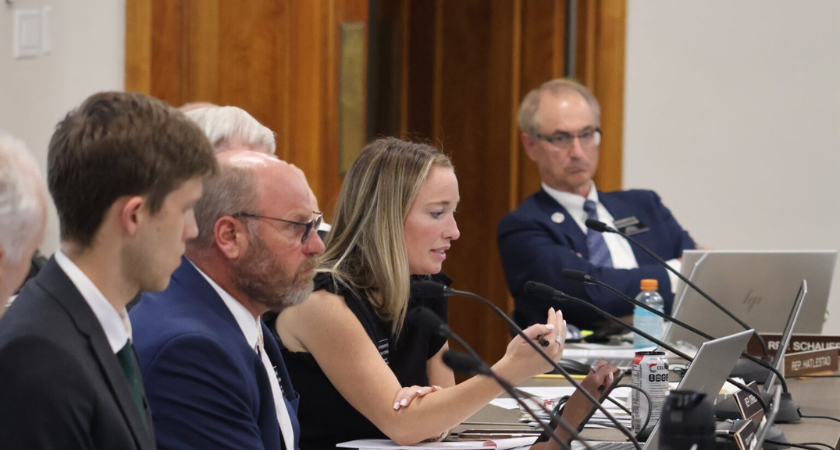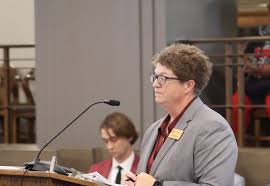
BISMARCK, N.D. — North Dakota lawmakers are still pressing for answers over the Attorney General’s Office’s handling of a controversial building renovation and lease in south Bismarck — a project that has already sparked years of investigations, ethics violations, and criminal charges.
While agency staff told the Legislative Audit and Fiscal Review Committee on Thursday that all financial discrepancies have been resolved, legislators questioned why no formal documentation exists to prove it. The dispute centers on a Burlington Drive property that was renovated to house several divisions of the Attorney General’s Office, a project that went at least $1.7 million over its initial cost projections.

The building deal first came under scrutiny because one of its partial owners, Rep. Jason Dockter, R-Bismarck, was convicted of a conflict of interest misdemeanor for his role in the arrangement. More recently, the North Dakota Ethics Commission found Dockter had violated ethics rules by voting for budget bills that included funding for the lease.
Financially, the controversy stems from overpayments made by the state to Stealth Properties, the building’s owner. While both parties agreed the state had paid too much, their calculations on the overage differed. The Attorney General’s Office says it recovered about $525,000 but opted not to pursue an additional $14,600 flagged in an outside review.
“We determined internally that it wasn’t worth the time and effort and resources to continue to try to recover $14,000 when we have recovered $525,000,” said Laura Balliet, an attorney for the Attorney General’s Office.
However, Stealth’s attorney, Monte Rogneby, told lawmakers that the company was unaware the matter was considered closed. “Stealth has provided documentation to the Attorney General’s Office of construction costs and its financial reconciliation,” Rogneby said in a statement. “It has not received any communication from the attorney general raising any concerns with the lease or the reconciliation of construction costs.”
Sen. Brad Bekkedahl, R-Williston, questioned why there was no signed agreement between the state and Stealth to officially close the books. “I still would have wanted some type of documentation signed by both parties saying that there’s no longer a dispute,” he said. “It just seems really messy to me, and not very open or transparent.”
Balliet could not explain why such documentation wasn’t pursued but said her office can provide lawmakers with records at the committee’s December meeting.
The matter dates back to 2019, when former Attorney General Wayne Stenehjem’s administration selected the Burlington Drive building for extensive renovations. Stenehjem’s successor, Attorney General Drew Wrigley, brought the cost overrun to lawmakers’ attention after taking office in 2022, triggering a review by State Auditor Josh Gallion and a separate investigation by the Montana Division of Criminal Investigation.
The Montana probe was hampered by a lack of subpoena power, and Mountrail County State’s Attorney Wade Enget, who reviewed the findings, said some questions about the lease fell outside his scope.

The Ethics Commission’s report largely focused on Dockter’s conflict of interest but also raised broader concerns about whether all expenditures were authorized by either the Legislature or the state’s Emergency Commission.
Mary Kae Kelsch, a division director in the Attorney General’s Office, defended the legality of the expenditures, saying the office had appropriation authority for leases. “Was it illegal? No, but it wasn’t managed well,” she acknowledged.
According to Kelsch, the $1.7 million increase over projections was not technically an “overage” since the lease placed no spending cap. “It’s just there was no cap put on, and so the till was running, the meter was running, and no one was paying attention to the meter,” she said.
In a letter to the committee Wednesday, Wrigley maintained that “all financial loose ends” had been tied up and dismissed the Ethics Commission’s concerns. Wrigley, who was out of the country Thursday, did not attend the meeting.
Yet doubts linger. Pat Monson, a former trial attorney who investigated Dockter for the Ethics Commission, said she was never provided with information showing the finances were reconciled. “There were so many discrepancies within the invoices and the bills and costs that were submitted by Stealth to the AG’s office,” Monson said. “How and when those discrepancies were overcome and agreed upon is really unclear.”
While lawmakers considered calling for another state audit, they agreed to first request formal documentation from the Attorney General’s Office before taking further action. Bekkedahl also urged the agency to report to the Legislature’s Budget Section about the $525,000 repayment to the state.
With another update expected in December, the dispute — now stretching across two attorney generals, multiple investigations, and years of political scrutiny — continues to raise questions about transparency and accountability in North Dakota’s handling of taxpayer-funded projects.
Originally reported by Mary Steurer in North Dakota Monitor.